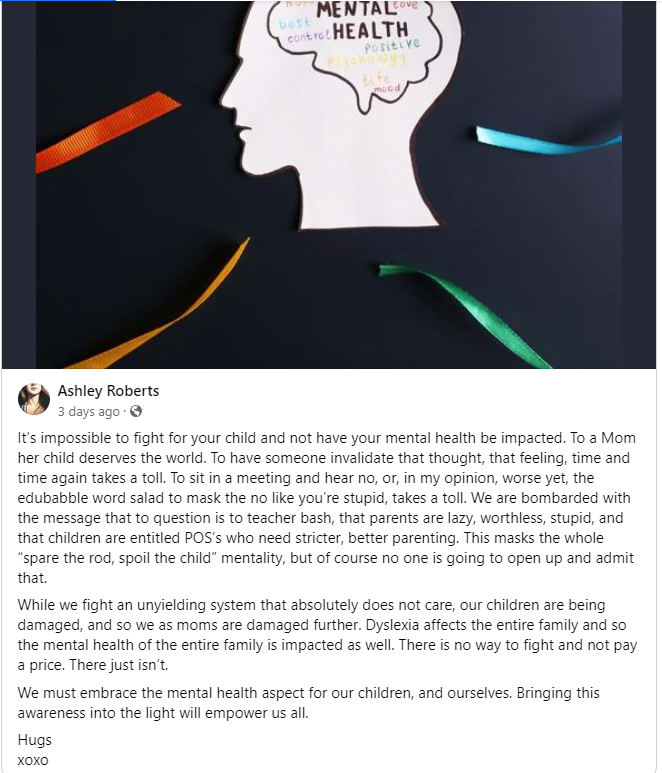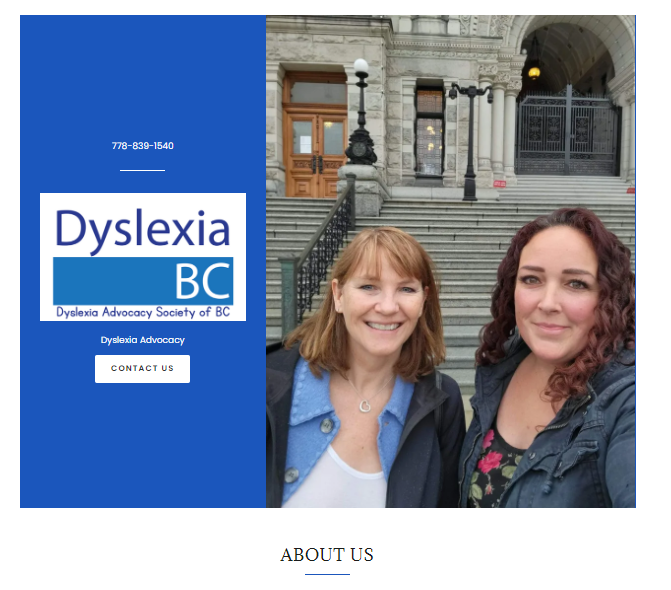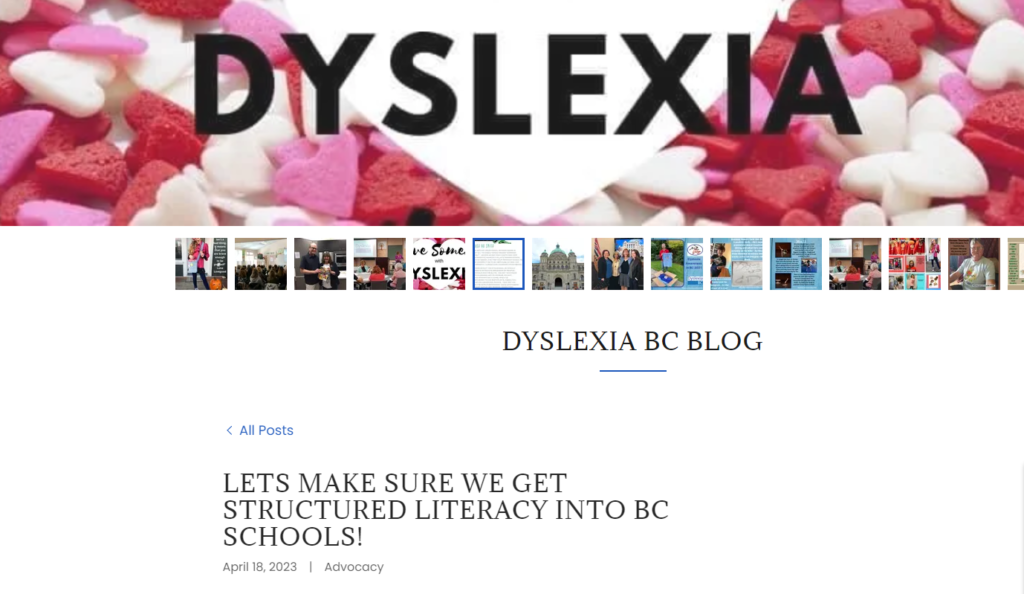This mom speaks the truth. Thank you Ashley Roberts, The Dsylexia Initiative.

The government distributes society’s resources, and this distribution is not an equitable one. It is based on the wishes of the majority of voters. 27% of people have disabilities in Canada. An article by The Tyee, “Why is Vancouver Funding an Extremely Expensive Private Dyslexia School? questions how these resources are being divided. I question funding for private schools in general, as they seem to be getting a good chunk of taxpayers’ money. Yet, only families who can afford to pay costly yearly tuition fees can access their services, while the schools are escaping human rights violations due to their private business structure. Funded by the government, yet given an escape pod via the “undue hardship” justification test of a limited private business. As this parent feels, some specialized schools are providing the supports that kids aren’t getting in public schools. This option is not available to everyone. You need money. Lots of it. Every year. You need the time, ability and transportation to get your child there. Private schools are an impossibility for most.
Currently, our system is prioritizing some kids over others by how they design teacher education post-secondary programs. Teachers aren’t being properly trained for inclusion. Deciding not to inform teachers about human rights and science-based accommodations is a decision. Surveys internationally are all coming back with the same data. In Canada too, Teachers don’t feel adequately prepared for children with disabilities in their classrooms. And here. And here. And I could go on… and on…. and on.
Children are always going to be vulnerable. They are vulnerable because they don’t have a choice to leave. When children with learning disabilities are not getting proper instruction and support at school they experience levels of shame, embarrassment, chronic stress, anxiety, fear and sometimes bullying. Children are extra vulnerable when they have disabilities. They are in an education prison. They are completely dependent on a society that is ableist, misinformed and sees them as an easy target or easier to sweep aside.
The kids get the message daily that they are a burden to society. Someone who should feel lucky to be tolerated. These messages become internalized.
There are some legislative advancements with the federal and provincial Accessibility Acts.
However, for Canada to become barrier-free by 2040 it would entail a complete culture shift.
Employers post these boilerplate disability statements about being inclusive. However, inviting us to the table just isn’t enough. We need to be included at a level that we are participating in changing the shape of the table. Expecting us to carry on and fit into the same rules, and think the same way, isn’t inclusion. It’s not diversity. It’s performative and useless. For autistic and other neurodiverse individuals it can lead to burnout, mental health issues, and employment issues.
We know that change within society takes time. It’s painfully slow, that is true.
While we are waiting for society to evolve…we need to acknowledge harm is being done. Significant life-altering harm. Let’s take a look at the harsh reality.
Kids are dropping out of school. 30-40% of kids with ADHD drop out of high school.
They are escaping to the streets. 80% of homeless youth have Dyslexia.
They are more likely to engage in self-medicating themselves with drug use.
Their risk of them ending up in prison is higher, leading to the over-representation of people with neurodiversity and disabilities in prison.
From Decoding Dyslexia Ontario
Impacts of unsupported dyslexia: statistics
- In Canada, 40% of students with LD, including many with dyslexia, experience mental health issues including anxiety and depression
- A survey by the Learning Disabilities Association of Canada found that: “almost 50% of adolescent suicides have a diagnosis of a learning disability
- In Canada, Patterson et al. (2012) found that dyslexia was overrepresented within the homeless population
- Statistics Canada research indicates that people with “learning limitations,” including dyslexia, experience under-employment and unemployment at a much higher rates
- Adults with dyslexia are more than five times as likely to have suffered physical abuse
- Research from the Literacy and Policing Project indicates that 65% of Canada’s incarcerated population reads at less than a grade 8 level of literacy. International research indicates that a large majority of people who are incarcerated are dyslexic
This is not their individual failure. This is a societal failure. Just how people at the Oscars walk up to the stage to collect their awards, they thank all of the people who helped them along the way. They recognize that they didn’t get to that stage by themselves. Well, guess what folks, the kids dropping out, on the streets, self-medicating and ending up in prison didn’t get there by themselves either. We are failing them. Our education system is failing them. Society’s norms are not inflexible laws of gravity. We can change the structures of human systems. We can operate, function, interact and live differently. Our schools don’t need to function this way.
So, when we make our decisions…our laws, our policies, our education training programs…who are we willfully ignoring?
This question needs to be asked EVERY SINGLE time the government makes a decision.
Who is benefiting from this policy or law? Certain people are. It won’t be everyone. So who? Name them. Write it down.
Who is going to be potentially harmed by this policy or law? There will be people harmed in some way by everything they do. So who? Name them. Write it down.
- Crowded classrooms push kids with disabilities out the door.
- Underfunding schools pushes kids with disabilities out the door.
- Lack of proper training of teachers and support staff pushes kids with disabilities out the door.
- Attitudinal barriers towards kids with disabilities are pushing them out the door.
Adults are pushing kids with disabilities out the door.
Advocating for children with disabilities is hard work, but worthy work. However, I want to acknowledge there is a weathering process parent(s)/guardians all experience. We are slowly eroded by the constant dripping in the advocacy process and/or we become stalagmites building ourselves up by the constant dripping process. These two realities are often braided together.
We are desperate for adequate teacher training. I am not talking about workshops in universal design. I am talking about adequate training in specific disabilities and neurodiversity. We need early screening for dyslexia. We can’t wait for kids to fall behind in literacy skills in grade 3 or 4 and then to be on an assessment waitlist for 2 years that costs $5,000.00. That wait-and-see philosophy is pushing them out the door. It is a disaster. The inaction of our government is failing children and families. There was such hope with the Supreme Court Decision that there would be
How a Dyslexic Student Could Change Canada’s Schools by The Tyee (Nov 12, 2012)
“A momentous change for Canadian schools
If I read the Court’s decision (and the School Act) correctly, this and future provincial governments are now bound to provide funding that will ensure that all B.C. students, regardless of talents or disabilities, receive the kind of education set out in the School Act.
That would be a momentous change for schools across Canada as well — perhaps comparable to Brown vs Board of Education, the 1954 U.S. Supreme Court decision that struck down racial segregation in the schools.”
The United States has legislation. Where is Canada?
The government is failing children and families. It doesn’t make any friggen sense to not support children with neurodiversity and disabilities. When supported, kids with ADHD can thrive as adults. Dyslexic thinkers are also incredibly diverse thinkers. It makes no sense as a society to not help these kids flourish because it is possible. Kids with ADHD don’t even have a designation and dyslexia isn’t even a label that schools are allowed to use. “The term dyslexia is not commonly used in the educational system. It has been removed from legislation, policies, procedures and most teacher training programs.” Talk about erasure. We can’t ever shut up about this.
Even if you want to make the argument that the government has limited resources, it doesn’t even make any economic sense to be ignoring such a huge group of people.
We have 1.8 million Canadians with ADHD.
10-20% of people in Canada have dyslexia.
As a country do we want this or this? What on earth is our country doing??
For the good, the bad, and the ugly, no one gets to where they are in life by themselves.
No one.
Here are some helpful organizations in BC

